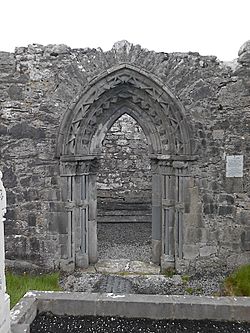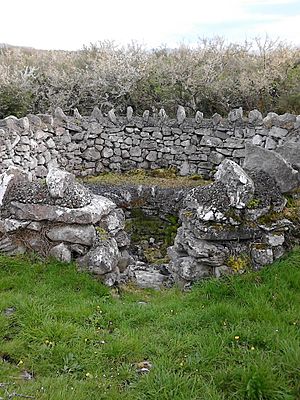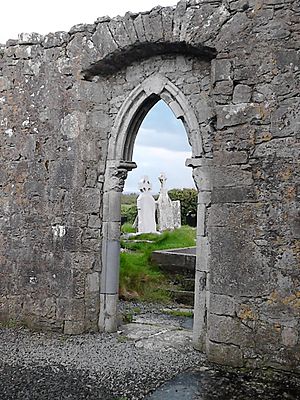Drumacoo facts for kids
| Droim Mucú | |

south doorway
|
|
| Monastery information | |
|---|---|
| Other names | Druim-muccado; Droma-Mucada |
| Established | 6th century AD |
| Diocese | Kilmacduagh |
| People | |
| Founder(s) | Sárnait |
| Architecture | |
| Status | ruined |
| Style | Late Gothic |
| Site | |
| Location | Drumacoo, Ballinderreen, County Galway |
| Coordinates | 53°11′55″N 8°54′17″W / 53.198723°N 8.904724°W |
| Visible remains | church, holy well |
| Public access | yes |
| Official name | Drumacoo Early Medieval Ecclesiastical Site |
| Reference no. | 254 |
Drumacoo is an old church site in County Galway, Ireland. It's a special place from the Middle Ages. Today, it is a protected National Monument. This means it's an important historical site.
Contents
Where is Drumacoo?
Drumacoo is found about 1.5 kilometers (about 1 mile) north of a village called Ballinderreen. It is also located to the east of Galway Bay, a large bay on the west coast of Ireland.
The History of Drumacoo
How Drumacoo Was Started
A long time ago, in the 6th century, a religious community was set up here. It was founded by a female saint named Sárnait. She was also known as Sourney. Saint Sárnait was buried at this site. Her burial place is called St. Sourney's Bed.
Drumacoo was part of an old kingdom called Uí Fiachrach Aidhne.
Building the Church
The first stone church at Drumacoo was built with large stones. It had a simple, flat-headed doorway on its west side. Later, around the 13th century, the church was made longer towards the east. A beautiful, finely carved doorway was also added on the south side.
Important People at Drumacoo
Old records, like the Annals of Loch Cé, tell us about people from Drumacoo. In 1232, a man named Fachtna Ó hAllgaith died. He was a leader at Drumacoo and an important official in the Uí-Fiachrach area. He was known for being very welcoming to guests and sick people. He also helped learning and improved the land.
Later Changes to the Church
In 1830, a new building was added to the stone church. This was a mausoleum, a special building for burying family members. It was built for the St George family in a style called Gothic Revival. This style looks like old Gothic churches.
What You Can See at Drumacoo Today
Today, you can see the ruins of the stone church. Nearby, there is a holy well, which is a special spring of water. There is also St. Sourney's Bush, which is a rag bush. People used to tie pieces of cloth (rags) to this bush as part of a tradition.




